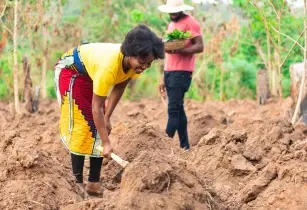The Government of Zimbabwe, South Korea and the Food and Agriculture Organisation of the United Nations (FAO) have joined hands to drive and strengthen the green jobs agenda for rural youth employment in the agriculture sector in the Zimbabwe
Launched in 2020, the four-year Green Jobs for Rural Youth Employment (GJ4RYE) project has been providing soft skills training, agrifood sector-specific training, and up to two years of waged employment opportunities, entrepreneurial grants and mentorship support to selected rural youth in Sierra Leone, Timor Leste and Zimbabwe.
With one year remaining on the project lifespan, stakeholders organised a tour to demonstrate the GJ4RYE project achievements including sharing challenges to better inform sustainable implementation of the project as it enters its final phase.
The GJ4RYE project is anchored on three components that is, capacity building, providing green jobs opportunities and evidence based policy support to the government. The flagship accelerators of the project include participatory involvement, development and implementation of home grown initiatives while empowering young people to be more aware of their environment and choose employment opportunities that can support their families and empower them to be responsible decision makers.
Ambassador Bong-Kae Do affirmed the Korean government’s commitment and partnership with Zimbabwe in agrifood systems transformation.
The tour concluded with stakeholders being presented with progress made since the project launch, while acknowledging the challenges on the ground and how the country and development partners can avert them.
The project committed to implement mentoring processes around ‘greening businesses’ management and group dynamics; enhanced production skills and access to markets and risk management for longevity and sustainability of their livelihoods after the project.
“I am happy to have an interface with young agri-entrepreneurs, delegates from South Korea and all actors in the agricultural value chain working with youth in agriculture,” said Deputy Minister of Agriculture, Vangelis Haritatos.
“The Agriculture and Food Systems Transformation Strategy aims to make Zimbabwe food secure and create employment opportunities for the youth in the country and this resonates well with the Government’s National Development Strategy 1 and the green economy agenda,” Haritatos added.





